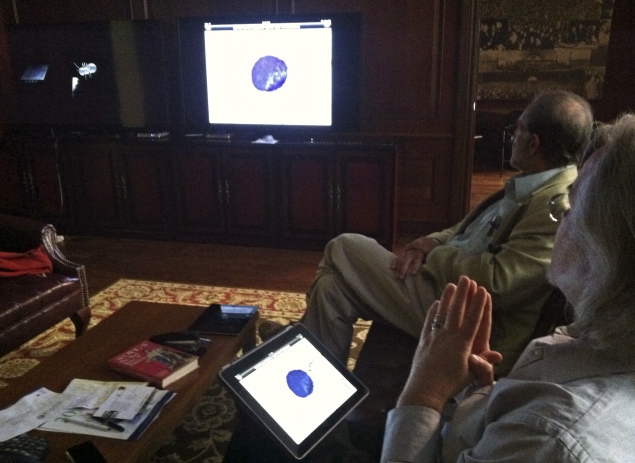- Home
- Laptops
- Laptops News
- A computer chip that mimics the human brain
A computer chip that mimics the human brain

Today's computing chips are incredibly complex and contain billions of nano-scale transistors, allowing for fast, high-performance computers, pocket-sized smartphones that far outpace early desktop computers, and an explosion in handheld tablets, the researchers said.
Despite their ability to perform thousands of tasks in the blink of an eye, none of these devices even come close to rivalling the computing capabilities of the human brain. But a Boise State University research team could soon change that.
Electrical and computer engineering faculty Elisa Barney Smith, Kris Campbell and Vishal Saxena have taken on the challenge of developing a new kind of computing architecture that works more like a brain than a traditional digital computer.
"By mimicking the brain's billions of interconnections and pattern recognition capabilities, we may ultimately introduce a new paradigm in speed and power, and potentially enable systems that include the ability to learn, adapt and respond to their environment," said Barney Smith, principal investigator of the study.
The project's success rests on a memristor - a resistor that can be programmed to a new resistance by application of electrical pulses and remembers its new resistance value once the power is removed.
Memristors were first hypothesised to exist in 1972 (in conjunction with resistors, capacitors and inductors) but were fully realised as nano-scale devices only in the last decade.
The team's research builds on recent work from scientists who have derived mathematical algorithms to explain the electrical interaction between brain synapses and neurons.
"By employing these models in combination with a new device technology that exhibits similar electrical response to the neural synapses, we will design entirely new computing chips that mimic how the brain processes information," said Barney Smith.
These new chips will consume power at an order of magnitude lower than current computing processors, despite the fact that they match existing chips in physical dimensions.
This will open the door for ultra low-power electronics intended for applications with scarce energy resources, such as in space, environmental sensors or biomedical implants.
Get your daily dose of tech news, reviews, and insights, in under 80 characters on Gadgets 360 Turbo. Connect with fellow tech lovers on our Forum. Follow us on X, Facebook, WhatsApp, Threads and Google News for instant updates. Catch all the action on our YouTube channel.
Related Stories
- Samsung Galaxy Unpacked 2026
- iPhone 17 Pro Max
- ChatGPT
- iOS 26
- Laptop Under 50000
- Smartwatch Under 10000
- Apple Vision Pro
- Oneplus 12
- OnePlus Nord CE 3 Lite 5G
- iPhone 13
- Xiaomi 14 Pro
- Oppo Find N3
- Tecno Spark Go (2023)
- Realme V30
- Best Phones Under 25000
- Samsung Galaxy S24 Series
- Cryptocurrency
- iQoo 12
- Samsung Galaxy S24 Ultra
- Giottus
- Samsung Galaxy Z Flip 5
- Apple 'Scary Fast'
- Housefull 5
- GoPro Hero 12 Black Review
- Invincible Season 2
- JioGlass
- HD Ready TV
- Latest Mobile Phones
- Compare Phones
- Tecno Pova Curve 2 5G
- Lava Yuva Star 3
- Honor X6d
- OPPO K14x 5G
- Samsung Galaxy F70e 5G
- iQOO 15 Ultra
- OPPO A6v 5G
- OPPO A6i+ 5G
- Asus Vivobook 16 (M1605NAQ)
- Asus Vivobook 15 (2026)
- Brave Ark 2-in-1
- Black Shark Gaming Tablet
- boAt Chrome Iris
- HMD Watch P1
- Haier H5E Series
- Acerpure Nitro Z Series 100-inch QLED TV
- Asus ROG Ally
- Nintendo Switch Lite
- Haier 1.6 Ton 5 Star Inverter Split AC (HSU19G-MZAID5BN-INV)
- Haier 1.6 Ton 5 Star Inverter Split AC (HSU19G-MZAIM5BN-INV)
-
 Astronomers Witness Rare Failed Supernova in Andromeda Galaxy
Astronomers Witness Rare Failed Supernova in Andromeda Galaxy
-
 Unique Inside-Out Planetary System Reveals Unexpected Rocky World on the Outer Edge
Unique Inside-Out Planetary System Reveals Unexpected Rocky World on the Outer Edge
-
 Google Chrome Brings Convenient Pinned Tabs Feature to Android Smartphone Owners
Google Chrome Brings Convenient Pinned Tabs Feature to Android Smartphone Owners
-
 Poco C81 Pro Appears on Thailand's NBTC Certification Database, Might Launch Soon
Poco C81 Pro Appears on Thailand's NBTC Certification Database, Might Launch Soon




![[Partner Content] OPPO Reno15 Series: AI Portrait Camera, Popout and First Compact Reno](https://www.gadgets360.com/static/mobile/images/spacer.png)





